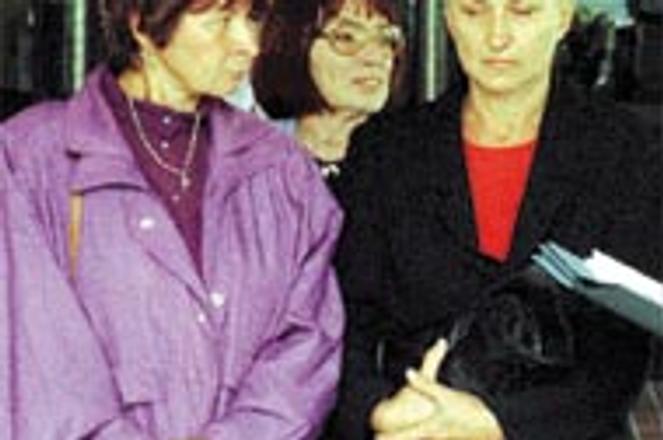Busted. Two Slovak women were arrested and kicked out of Great Britain for stealing mementos left for the late Princess Diana. To read more, please turn to page 3.Reuter
"Velvet" mythology to the contrary, it would seem that even political divorces are not without their rough edges. As recent statements by Slovak and Czech government officials demonstrate, much rancor still exists between the former partners, particularly over the question of who gets to keep the former federal gold reserves.
The dissolution of Czechoslovakia on December 31, 1992 left an embarrassment of riches to be divided between the new Czech and Slovak Republics. But almost five years later, many of those monies remain to be disbursed, principal among them several tons of gold with a market value of 1.7 billion Sk that are claimed by the Slovaks and 24.5 billion Sk in bank reserves demanded by the Czechs. Both sides have consistently accused eachother of double-dealing and have refused to back away from confrontation.
In the last month, however, the Czech government has appeared ready to compromise. At a recent summit of the Central European Free Trade Agreement (CEFTA) in Portorož, Slovenia, the Czech delegation made overtures towards their Slovak counterparts, while the Slovak state-run news agency TASR cited unofficial sources as promising an early October meeting between Czech and Slovak government leaders in Piešťany, Slovakia. Even if the reports are true, however, the political will that remains on both sides, after five years of hard words and bluster, may no longer be sufficient to strike a deal.
Time out
"The only big problem that exists in our relations with the Czech Republic is the question of Slovak gold and its physical return," insisted Ľubomír Goľan, deputy director of the political department at the Slovak Foreign Ministry. "At the CEFTA meeting, we received a signal from the Czech side that they are interested in this question and wanted to meet with us, but it is impossible to resolve such complex problems during short discussions."
A Slovak government source, accounting for the change in Czech thinking, explained that Czech Premier Václav Klaus has recently been pressured to settle the gold issue. The heat had come from the Czech privatization lobby, whose plans to buy up state-owned banks are on hold until the issue is resolved. The problem, however, is that Klaus may not get enough support from his coalition partners in the Czech Parliament to push a compromise package through.
Goľan would not comment on domestic Czech politics, but conceded that "it would be very good if the Czech side has the political will and sufficient political consensus to resolve this problem with Slovakia." The fact that the Czechs have reconvened the Committee for the Division of Federal Property after a four year hiatus, Goľan said, is a positive sign.
But the Slovak side is still being cagey about its willingness to meet with the Czechs. Slovak Prime Minister Vladimír Mečiar said he would "neither confirm nor deny" reports of a planned meeting with Klaus in Piešťany. Goľan, for his part, insisted that "we have nothing on paper" regarding a meeting, but conceded that "we are waiting for an agenda proposed by the Czech side. If the division of gold is on it, that would be a very good signal."
How it came to be
But the roots of the current dispute run deep. "When we speak about the dissolution of Czechoslovakia, we must remember that the Czechs have taken advantage of us," said Vladimír Hagara, spokesman for one of Slovakia's governing parties, the Movement for a Democratic Slovakia (HZDS). "They still owe us 4.2 tons of gold, and we were also cheated when the federal [shipping] fleet was divided," he said. "There are lots of other things that can be added up to 20 billion Sk," he added, giving his estimation of the total worth of Czech debts to Slovakia from the split.
Hagara's assertions represent a still widely-held view in Slovakia, that the country has been more sinned against than sinning over the division of former state property. Juraj Martoník, the Slovak Foreign Ministry's chief desk officer for Czech and Slovak relations, explained that the gold was the subject of an agreement signed by the National Bank of Slovakia (NBS), the Czech National Bank and the Czechoslovak State Bank on December 31, 1992. Known as Protocol 1, the contract stipulated that the gold bullion be returned to Slovakia by June 30, 1993, but according to the Slovak side, was reneged on by the Czechs. "The broken contract has since been used as [leverage] to force Slovakia on other problems concerning the division of state property," Martoník said.
Counterpunching
Those 'other problems' might have included the 24.5 billion Sk that the Czech government says it is owed by the NBS, which stems from the division of active and passive finances of the former Czechoslovak State Bank (ŠBČS).
The NBS denies the Czech monetary claim. "We do not acknowledge this debt," stated NBS spokesman Ján Onda.
The division of ŠBČS finances was unfair, Onda said, because of "bad financial relations between the Czech and Slovak Republics." During 1992, he explained, Czech commercial banks had withdrawn their financial investments from the Slovak financial market and placed the funds with the federal bank.
When ŠBČS actives and passives were eventually divided, the Czech banks held on to a larger share of the assets, which were recorded as NBS debts. "The NBS ended up short by 24.5 billion Sk," concluded Onda, "and on the other hand never received proper compensation for its participation in financing the ŠBČS which, after the division, was taken over by the Czech side."
Despite signs that compromise might at last be at hand, the rhetoric continues unabated. "Our partners have failed us so many times in this century that we are perhaps more sensitive than anyone else to what they do," said Mečiar on an August 27 Czech television program.



